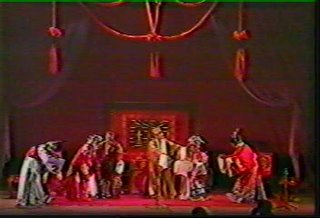 Title: Li Miaohui (李妙惠)
Title: Li Miaohui (李妙惠)Genre: Fujian Xiang opera (芗剧)
Format: Stage opera
Production year: 1993
Director: Wu Ziming
Script: Shao Jianghai, Guo Zhixian (rearranged)
Music: Yang Senlin, Su Dengfa
Casts: Zheng Xiuqin as Li Miaohui, Hong Zhenping as Xie Qi, Hong Cailian as Lu Mengxian, Yang Yuexia as Bai Jinhua, Han Tiansong as Lu Nanchuan, Jiang Tiedan as Bai Laofu, Xiao Shuqin as Hua Mifeng
At first glance...
 This is one of the first original Fujian Xiang opera scripts ever written by the late Fujian Xiang opera master Shao Jianghai. So far no other Chinese opera genres have this same show telling the tale of a man who “married a woman to become her brother”!
This is one of the first original Fujian Xiang opera scripts ever written by the late Fujian Xiang opera master Shao Jianghai. So far no other Chinese opera genres have this same show telling the tale of a man who “married a woman to become her brother”!
Synopsis
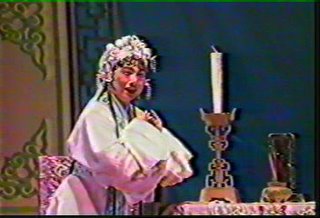 Li Miaohui was a ill-fated widow. Her husband Lu Mengxian was reported dead while on his way to pursue the imperial examinations. Subsequently her family was reduced from riches to rags in a fire breakout followed by flood. One day, Guangdong salt merchant Xie Qi was cruising down the river when he saw Li Miaohui washing clothes by the riverbank. He was captivated by her beauty and hence got a matchmaker to try ask for her hand from her father-in-law. Old Mr. Lu did not want his daughter-in-law to suffer with him, therefore he forced Li to get remarried to Xie. However on the wedding night, Li tried to commit suicide, but was subsequently saved by Xie. Xie was touched by Li’s love for her late husband and decided to become her sworn-brother instead.
Li Miaohui was a ill-fated widow. Her husband Lu Mengxian was reported dead while on his way to pursue the imperial examinations. Subsequently her family was reduced from riches to rags in a fire breakout followed by flood. One day, Guangdong salt merchant Xie Qi was cruising down the river when he saw Li Miaohui washing clothes by the riverbank. He was captivated by her beauty and hence got a matchmaker to try ask for her hand from her father-in-law. Old Mr. Lu did not want his daughter-in-law to suffer with him, therefore he forced Li to get remarried to Xie. However on the wedding night, Li tried to commit suicide, but was subsequently saved by Xie. Xie was touched by Li’s love for her late husband and decided to become her sworn-brother instead. Not long after, Lu Mengxian was “revived” and returned home as a top scholar! It turned out that Lu had not died on his way to the imperial city, but was robbed of his possessions and subsequently being saved a passerby. However, a confusion arose later on, when another man of similar-sounding name died in the same region, leading his family servant to mistook this dead man as Lu himself.
Not long after, Lu Mengxian was “revived” and returned home as a top scholar! It turned out that Lu had not died on his way to the imperial city, but was robbed of his possessions and subsequently being saved a passerby. However, a confusion arose later on, when another man of similar-sounding name died in the same region, leading his family servant to mistook this dead man as Lu himself. Lu was devastated to find that his wife had remarried to Xie Qi. Jinhua, a childhood playmate and neighbour of Lu, was deeply moved by Lu’s love for Li. On seeing Jinhua’s admiration for his son, Old Mr. Lu got his son to marry Jinhua. Lu was reluctant, and only accepted Jinhua as his sworn-sister. On the night of his wedding, he sneaked away to Guangdong to look for his wife. The entire family gave chase, and after much explanation and persuasion, this complicated affair finally had a happy ending: Li and Lu were reunited again, while Jinhua became Xie’s wife.
Lu was devastated to find that his wife had remarried to Xie Qi. Jinhua, a childhood playmate and neighbour of Lu, was deeply moved by Lu’s love for Li. On seeing Jinhua’s admiration for his son, Old Mr. Lu got his son to marry Jinhua. Lu was reluctant, and only accepted Jinhua as his sworn-sister. On the night of his wedding, he sneaked away to Guangdong to look for his wife. The entire family gave chase, and after much explanation and persuasion, this complicated affair finally had a happy ending: Li and Lu were reunited again, while Jinhua became Xie’s wife.
Review
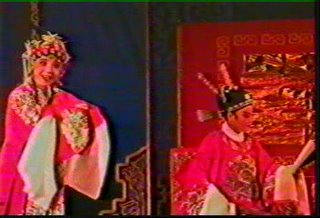 This is a VCD show which I’ve bought from China. The recording quality was bad, probably recorded off from video tape, which was in turn recorded off from TV. There were no subtitles to the entire show, so it was a bit hard to understand at some point. Fortunately I had the original cassette recording of the show (a even earlier production) complete with the lyrics to the songs, hence I was able to grasp the meaning to most of the songs.
This is a VCD show which I’ve bought from China. The recording quality was bad, probably recorded off from video tape, which was in turn recorded off from TV. There were no subtitles to the entire show, so it was a bit hard to understand at some point. Fortunately I had the original cassette recording of the show (a even earlier production) complete with the lyrics to the songs, hence I was able to grasp the meaning to most of the songs.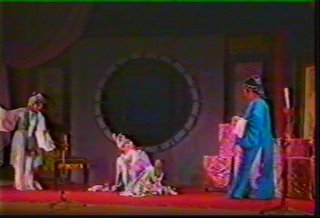 For the storyline, many scenes had been sliced off from the original script in order to make the plot more compact. This however did not compromise the integrity of the script. In fact it made the show easier to digest, as the original complete show would require 2 days to act.
For the storyline, many scenes had been sliced off from the original script in order to make the plot more compact. This however did not compromise the integrity of the script. In fact it made the show easier to digest, as the original complete show would require 2 days to act.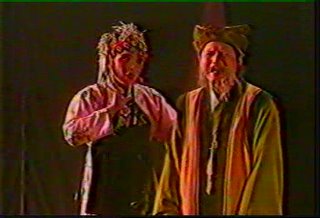 Acting the role of Li Miaohui is first grade actress Zheng Xiuqin. She is the only first grade Xiang opera actress in China now, and in the history of Xiang opera culture, only 2 actresses have been awarded this honour. Her shen duan was good, and her singing can really move the audience to tears. However, her looks were at a disadvantage as her age was catching up. Hong Zhenping's clownish rendition of Xie Qi was hilarious, funny yet not compromising with his shen duan. A pity that his singing was just average. Hong Cailian, who acted as Lu Mengxian, has got good shen duan, but wasn't as good as before due to age. Yang Yuexia's performance as Bai Jinhua was average, and Xiao Shuqin's portrayal as Hua Mifeng (matchmaker) was funny, but her shen duan was average too.
Acting the role of Li Miaohui is first grade actress Zheng Xiuqin. She is the only first grade Xiang opera actress in China now, and in the history of Xiang opera culture, only 2 actresses have been awarded this honour. Her shen duan was good, and her singing can really move the audience to tears. However, her looks were at a disadvantage as her age was catching up. Hong Zhenping's clownish rendition of Xie Qi was hilarious, funny yet not compromising with his shen duan. A pity that his singing was just average. Hong Cailian, who acted as Lu Mengxian, has got good shen duan, but wasn't as good as before due to age. Yang Yuexia's performance as Bai Jinhua was average, and Xiao Shuqin's portrayal as Hua Mifeng (matchmaker) was funny, but her shen duan was average too.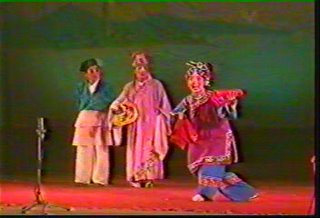 This opera is a very traditional opera, in the sense that it concentrates alot on singing. Scene 2 and scene 5 are 2 major scenes with lots of singing. In scene 2, Zheng Xiuqin sang solo for almost 3/4 of the scene, a total of about 52 lines, about Li Miaohui's yearning for her husband's return as well as her unwillingness to remarry. In scene 5, Hong Cailian and Yang Yuexie took turns to sing, Lu Mengxian expressing his unwillingness to betray his wife by marrying Jinhua, and Jinhua trying to reason that Li Miaohui's remarriage could not be annulled. I find the music for this show was quite well composed. The tunes were very melodious, and goes well with the traditional feel of the opera. Besides the focus on singing, the dialogues used in this show, especially that of the Xie Qi, was written with a rich minnan (Hokkien) flavour. One will find that Xie Qi's dialogues are usually very rhyming. This kind of rhyming dialogues is a characteristic of traditional chou roles, probably borrowed from "Da Zui Gu", a kind of minnan folk comedy.
This opera is a very traditional opera, in the sense that it concentrates alot on singing. Scene 2 and scene 5 are 2 major scenes with lots of singing. In scene 2, Zheng Xiuqin sang solo for almost 3/4 of the scene, a total of about 52 lines, about Li Miaohui's yearning for her husband's return as well as her unwillingness to remarry. In scene 5, Hong Cailian and Yang Yuexie took turns to sing, Lu Mengxian expressing his unwillingness to betray his wife by marrying Jinhua, and Jinhua trying to reason that Li Miaohui's remarriage could not be annulled. I find the music for this show was quite well composed. The tunes were very melodious, and goes well with the traditional feel of the opera. Besides the focus on singing, the dialogues used in this show, especially that of the Xie Qi, was written with a rich minnan (Hokkien) flavour. One will find that Xie Qi's dialogues are usually very rhyming. This kind of rhyming dialogues is a characteristic of traditional chou roles, probably borrowed from "Da Zui Gu", a kind of minnan folk comedy.
In short, I find this opera a gem of Xiang opera. It has all the elements of traditional Xiang opera: sorrowful singing, comedy and simple storyline which audience can easily identify with. If you love traditional Chinese opera, this show would be a good one to see, though the video quality and lack of subtitles could cause a problem.
Ratings
Script
Music
Casts
Video quality
Final rating
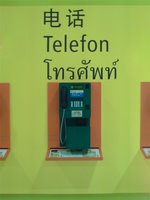

4 comments:
ML bought this vcd for me last year when she visited SYR. Teacher Yang brought her to his friend's shop. But the vcd couldn't function, it just played for a few minutes and stayed stagnant, non-moving. I prefer watching a xiangopera live on stage than in vcds as you need patience to watch without subtitles and poor video quality. Most of the xiang opera vcds in China especially the ones recorded during the 80s were bad in video quality. This can easily get into your nerves and mar your attention. The music of xiang opera is definitely A plus and this is the dynamic area that I like the best.
Don't you find it ironic? Shows produced in the 60s, when the technology is more backwards, are acually better than those produced in the 80s! Not just Hokkien opera, but also Yueju opera, etc.
Some legends remain classic till now. (LOL)
not so much on the plot, but the production quality. Somehow shows in the 60s have better video quality than those in the 80s. Let if you buys yueju VCDs produced in the 80s, you'll always see a disclaimer that the original video quality is bad due to it being recorded live and blah blah blah.. crap!
Post a Comment